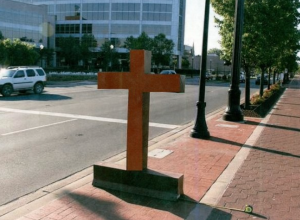 EVANSVILLE, Ind. – Several churches in southwestern Indiana had been planning to display a collection of artistic crosses in the middle of their town, but a lawsuit from the American Civil Liberties Union (ACLU) has now put that plan in jeopardy.
EVANSVILLE, Ind. – Several churches in southwestern Indiana had been planning to display a collection of artistic crosses in the middle of their town, but a lawsuit from the American Civil Liberties Union (ACLU) has now put that plan in jeopardy.
West Side Christian Church (WSCC) in Evansville recently announced plans for the first annual “Cross the River” campaign, scheduled for August 4–18. By collaborating with several community churches, WSCC members were hoping the project would raise funds for the Evansville Rescue Missions Camp Reveal and Childcare Assistance Resources of Evansville.
“Cross the River will display 31 6’ tall crosses,” WSCC’s website explains, “each decorated differently by its sponsor, one of the various inter-denominational churches or faith-based organizations who are unified through the common symbol of the cross. Each cross will be decorated with a specific theme in mind so each cross will be different.”
Last month, the Evansville Board of Public Works discussed in detail the proposed cross display during a board meeting. Meeting minutes obtained by Evansville Courier & Press document the lengthy discussion board members had with Mike Day, a contractor who is planning to supply the crosses for the display. During the meeting, Day explained that the monuments will be “a show of faith” for the over 200 churches in the greater Evansville area. In addition, the city’s Corporate Counsel Ted Ziemer affirmed that the crosses would not violate any laws.
“Individuals have the right to express [religious beliefs],” Ziemer stated during the meeting. “You can go down and stand on the riverside [or] riverfront if you want to and preach, and you can do that, and no one can stop you from doing that, unless you’re interrupting traffic or somehow disrupting things … [T]o display a symbol of your faith [is] … something that you have the right to do. The city could not, on its own, put up any religious devices, but an individual has the right to freedom of express[ion].”
Two weeks later, the Evansville board again discussed the cross display proposition. According to minutes from the meeting, WSCC’s Roger Lehman answered questions from board members about the Cross the River campaign, and also pointed out that the crosses would probably draw people to the city’s downtown area.
“We feel like this will bring people to the riverfront that might not otherwise come,” Lehman remarked. “I know that some of our congregation, they’re a little bit older and they don’t come down for festivals and things because it’s kind of hard to park and get around. If we have this down here from our church, as well as other churches that we have represented here, then it’s likely to actually draw people to the riverfront, which I think is probably good.”
Following the meeting, members of the board unanimously voted to grant the churches permission to display their six-foot-tall crosses in August. However, the ACLU—a church-state separatist group—filed a lawsuit five days after the meeting, arguing that the Cross the River project violates the First Amendment of the U.S. Constitution.
“A cross, such as those that will be installed on the Riverfront, is perhaps the most well-known symbol in the world of the Christian faith,” the lawsuit alleges. “The display of these crosses on public property serves no secular purpose, and has the effect of advancing religion. A reasonable person viewing even one of these crosses would conclude that the City was endorsing religion and the Christian faith.”
Following the ACLU’s lawsuit, Evansville officials defended the Board of Public Works’ decision to permit the Cross the River exhibition, suggesting that any reasonable observer will realize that the crosses are from churches, and not from the city. However, to make sure this distinction abundantly clear, city board members approved last week signs to be displayed with the following disclaimer: “The city of Evansville does not endorse the display or its message. The display is sponsored by and funded by a private entity.”
In the meantime, Alliance Defending Freedom (ADF)—a non-profit religious freedom advocacy group—announced on Tuesday that they have filed a motion to intervene in the ACLU lawsuit and protect the churches’ liberties. ADF says ACLU lawyers are “seeking to enjoin and destroy” the Evansville churches’ efforts.
“If [ACLU representatives] succeed in this lawsuit,” the ADF’s intervention states, “the churches will be deprived of the time, effort, money and property expended in creating, permitting, erecting and maintaining the crosses, including their interest in expressing their viewpoint in the public forum known as the Riverfront for a brief two-week period in August of 2013.”
ADF attorney Bryan Beauman said in a press release that the churches’ basic freedoms are being threatened by the ACLU.
“A public display, approved in the same way as other types of displays cannot be singled out for censorship simply because it is in the shape of a cross,” Beauman wrote. “The ACLU’s misinterpretation of the First Amendment should not be allowed to uproot this fundamental freedom.”
Photo: ACLU
Become a Christian News Network Supporter...


